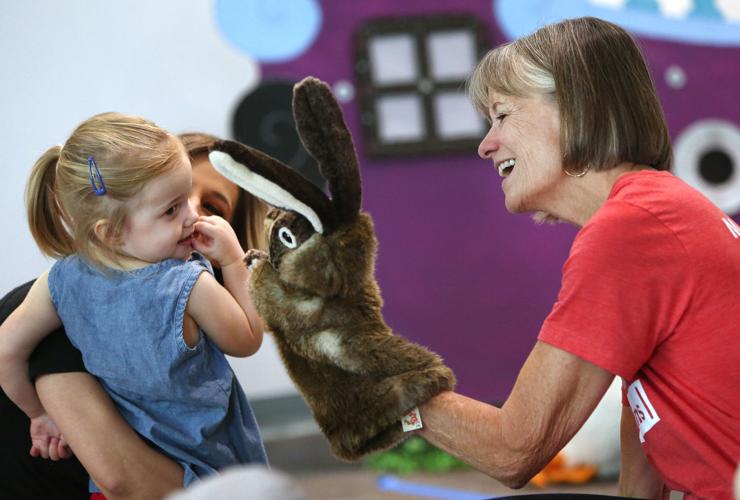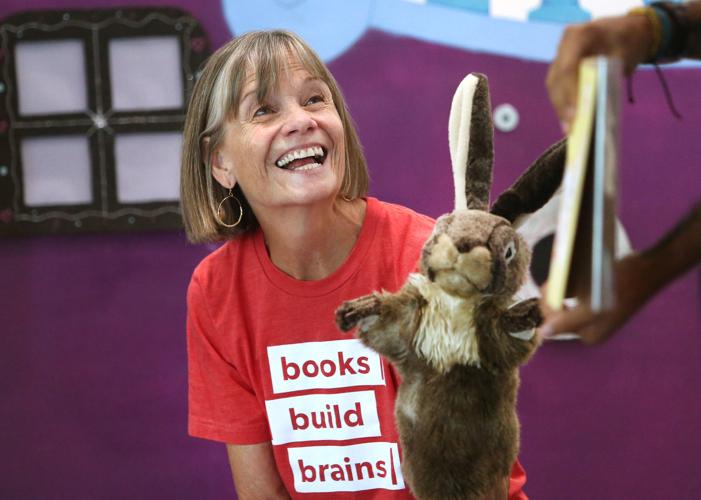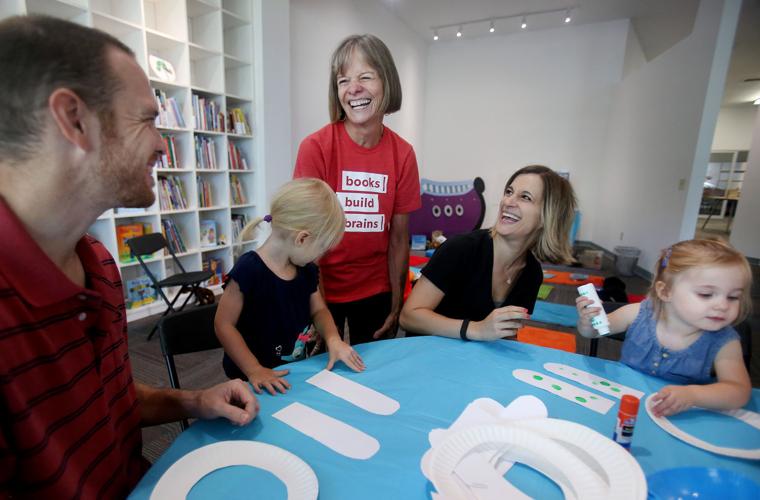Once upon a time, there was a woman who loved children’s books.
In fact, Mary Jan Bancroft loved books so much, she wanted to make sure all the kids in Tucson could, too.
Seventeen years ago, Bancroft, 61, made a way for babies, toddlers and young children to get their hands on stories before reaching kindergarten — even if they or their preschool have limited access to quality books.
The nonprofit organization she founded, Make Way for Books, provides early literacy resources to children, families and educators, especially in low-income areas.
Kids who don’t have any sort of educational experience before starting kindergarten often start school behind and have difficulty catching up, says Make Way for Books executive director Jenny Volpe. Children living in poverty are notably at risk of lacking literacy resources.
In May, Make Way for Books moved from its previous location near Fort Lowell Road and Alvernon Way to 700 N. Stone Ave. With programs ranging from professional development for educators to interactive story times to book sharing, the nonprofit needed more space.
A grant of $492,700 from Angel Charity for Children helped them move into the new building, Volpe says.
“Our main mission is to help kids have an opportunity for success by giving them experiences with reading before they get to kindergarten,” Bancroft adds.
Since starting Make Way for Books out of a room in her husband’s law office, Bancroft has seen her organization grow to serve more than 30,000 children and families each year and work with hundreds of educators, preschools and child-care centers.
“What’s so cool about this is because of Mary Jan starting Make Way for Books, early literacy has become part of Tucson preschools ...,” Volpe says. “She gave her leadership and set such a great example and paved the way for people to understand the importance of this to our community.”
CHAPTER ONE: YOUNG READERS
As a girl, Bancroft mostly read for school.
“I did have friends who loved to read for pleasure, and they would read in the bathtub, and I thought, ‘You’re crazy,’” she says. “As I got older, I started to read more for pleasure.”
Her parents often read aloud to her, and books were always around. She had her own small bookshelf, and remembers her mother keeping a book stashed under a chair in the den.
Bancroft grew up to earn a bachelor’s degree in elementary education from Southern Methodist University, a master’s in special education from University of Texas at Dallas and a doctorate in experiential education from the University of Colorado. She taught elementary schoolchildren, including those in special education programs.
Despite that background, Bancroft didn’t learn about the importance of early literacy until she had two daughters of her own.
“At the time, early childhood education wasn’t really talked about very much,” she says.
But the University of Nevada, Reno, where Bancroft was part of the faculty, had an early childhood education program.
“I was learning from them, and they were saying, ‘You should have this many books if you have a baby in the house,’” she says. “I went home and looked around and thought, ‘We need more books.’”
Her daughters, about 2 and 4 at the time, are now book lovers in graduate school. Bancroft knows firsthand what early exposure to books can do.
“My mother preferred to read books with strong female characters, so we would grow up to be strong women,” says Bancroft’s 27-year-old daughter, Corinne Bancroft. “She went out of her way to find books where the princess was doing the saving.”
And that’s just what her mother did.
CHAPTER TWO: ORIGIN STORY
When the family moved to Tucson almost 20 years ago, Bancroft decided she would swap the university setting for volunteering around town.
“I answered a listing in the paper to read to 4-year-olds at the Pio Decimo Center downtown,” she says. “I started volunteering there and realized the children had very few books. And the ones they had were kind of tattered and torn.”
Around the same time, Bancroft had discovered through research a nonprofit in Chicago that focused on getting books to preschools in low-income areas.
“I thought, ‘That’s what Tucson needs!’” says Bancroft, who was born in Tucson but grew up in Dallas.
Bancroft and her husband funded a library for the Pio Decimo Center, and she began doing regular story times there.
With neighbor Jennifer J. Stewart, she mulled over a name for the nonprofit. Make Way for Books is a spinoff of the picture book “Make Way for Ducklings.”
“My children had every advantage in the whole world,” Bancroft says. “I just remember making that decision when they were both 2 and 4 that I wanted this for other children.”
Two more libraries in the South Tucson area became a reality with a grant from the Arizona Diamondbacks.
Then United Way of Tucson and Southern Arizona asked Make Way for Books to partner on a federal grant and put 50 children’s libraries in preschools and child-care centers. They did.
“We started out serving in the child-care centers and preschools, and we often would invite parents to do a parent workshop on a Saturday morning or evening, and they wouldn’t come because they have been working all day and just wanted to get their child and go home,” Bancroft says.
So Make Way for Books staff and volunteers started meeting families at places such as apartment complexes and community centers.
The organization now offers programs that empower parents, preschools, child-care centers and educators to help young children enjoy books.
“It’s not that we’re teaching them to read,” Stewart says, “it’s more like having them fall in love with stories so they’re going to want to learn to read, and so they understand how stories work.”
CHAPTER THREE: LITERACY EVERYWHERE
Although Bancroft retired two years ago, she still participates as a board member and prop maker.
Because what is story time without a few props?
“She cares so deeply, and she is so enthusiastic, and she totally loves these kids,” says Helene Woodhams, the first employee at Make Way for Books, who is now a supervising librarian at the Dusenberry-River Library. “She would take something like ‘Owl Babies’ and say, ‘This is my favorite book,’ and she has this charming drawl, and when she was done (reading), it was my favorite book, too.”
Retirement has not changed Bancroft’s passion for early literacy. If she is in line next to a young mom at a store, she will talk up the Make Way for Books app that recommends age-specific books and gives parents tips on how to engage their children.
While spending the summer in Nevada near Lake Tahoe, Bancroft volunteered with a summer reading program and took therapy dog Nelson to read-to-a-dog sessions.
“If we travel, we stop in book stores to see what kinds of picture books there are for children ...,” says her husband, Paul Bancroft. “It’s definitely ingrained in her.”
And what started as a personal passion has grown. Make Way for Books now has its own building, a staff of about 30, an app and a book bus.
“I didn’t have big dreams for this yet,” she says of the early days, when she would take her daughters with her to story times and dress them up like the characters.
“She took me with her, and we had more books in my house than at that preschool ...,” Corinne Bancroft says. “My mom thought, ‘I can do something about this. I can change this.’
“And she has.”






